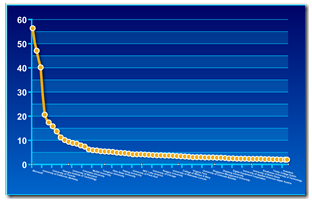Factoids from Best Paper Awards in Computer Science
January 6, 2021
I noted “Best Paper Awards in Computer Science Since 1996.” The year caught my attention because that was the point in time at which software stagnation gained traction. See “The Great Software Stagnation” for the argument.
The Best Papers tally represents awards issued to the “best papers”. Hats off to the compiler Jeff Huang and his sources and helpers.
I zipped through the listings which contained dozens upon dozens of papers I knew absolutely zero about. I will probably be pushing up daisies before I work through these write ups.
I pulled out several observations which answered questions of interest to me.
First, the data illustrate the long tail thing. Stated another way, the data reveal that if an expert wants to win a prestigious award, it matters which institution issues one’s paycheck:

Second, what are the most prestigious “names” to which one should apply for employment in computer science? Here’s the list of the top 25. The others are interesting but not the Broadway stars of the digital world:
| 1 | Microsoft | 56.4 |
| 2 | University of Washington | 50.5 |
| 3 | Carnegie Mellon University | 47.1 |
| 4 | Stanford University | 43.3 |
| 5 | Massachusetts Institute of Technology | 40.2 |
| 6 | University of California, Berkeley | 29.2 |
| 7 | University of Michigan | 20.6 |
| 8 | University of Illinois at Urbana–Champaign | 18.5 |
| 9 | Cornell University | 17.4 |
| 10 | 16.8 | |
| 11 | University of Toronto | 15.8 |
| 12 | University of Texas at Austin | 14.5 |
| 13 | IBM | 13.7 |
| 14 | University of British Columbia | 12.4 |
| 15 | University of Massachusetts Amherst | 11.2 |
| 16 | Georgia Institute of Technology | 10.3 |
| 17 | École Polytechnique Fédérale de Lausanne | 10.1 |
| 18 | University of Oxford | 9.6 |
| 19 | University of California, Irvine | 9.4 |
| 20 | Princeton University | 9.1 |
| 21 | University of Maryland | 8.9 |
| 22 | University of California, San Diego | 8.7 |
| 23 | University of Cambridge | 8.6 |
| 24 | University of Wisconsin–Madison | 8 |
| 25 | Yahoo | 7.9 |
Note that Microsoft, the once proud Death Star of the North, is number one. For comparison, the Google is number 10. But the delta in average “bests” is an intriguing 39.6 papers. The ever innovative IBM is number 13, and the estimable Yahoo Oath Verizon confection is number 25.
I did not spot a Chinese University. A quick scan of the authors reveals that quite a few Chinese wizards labor in the research vineyards at these research-oriented institutions. Short of manual counting and analysis of names, I decided to to calculate authors by nationality. I think that’s a good task for you, gentle reader.
What about search as a research topic in this pool? I used a couple of online text analysis tools like Writewords, a tool on my system, and the Madeintext service. The counts varied slightly, which is standard operating procedure for counting tools like these. The 10 most frequently used words in the titles of the award winning papers are:
| data 63 times |
| based 56 times |
| learning 53 times |
| using 49 times |
| design 45 times |
| analysis 38 times |
| software 36 times |
| time 36 times |
| search 35 times |
| Web 30 times |
The surprise is that “search” was, based on my analysis of the counts I used, was the ninth most popular word in the papers’ titles. Who knew? Almost as surprising was “social” ranking a miserable 46th. Search, it seems, remains an area of interest. Now if that interest can be transformed into sustainable revenue and sufficient profit to fund research, bug fixes, and enhancements — life would be better in my opinion.
Stephen E Arnold, January 5, 2020


